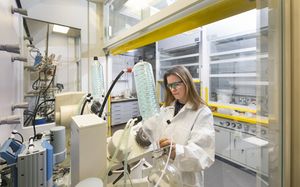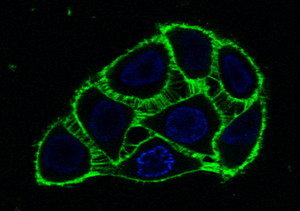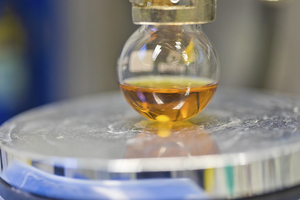“We know the structure of the enzymes fairly precisely and we know what they look like three-dimensionally,” Köhn explains. “That tells us a lot about their properties.” Using a computer model, she can see how a phosphatase bonds its natural partner, the target protein from which it chops off a phosphate. “Sometimes there are gaps in the bonding – weak points,” says Köhn. Then her team members can use synthetic chemistry to make molecules which fit better and bind more tightly. Experiments in the test tube and in cell culture then show whether the molecule bonds strongly enough. Can it block the docking site on the phosphatase, thereby inhibiting the enzyme?
Alternatively, the working group can carry out mutation studies. They create many variations of a phosphatase bonding partner and test each one to see how strongly it binds. “Then we cut out the docking site from the best bonding partner and build it into a new molecule,” says Köhn. If that works as planned, the docking point can be blocked and the corresponding phosphatase will be inhibited. “In the long run I hope that one of our molecules will spur the development of new bioactive molecules.” After all, why shouldn’t it be possible to do with phosphatases what has long been done with kinases? Some of the molecules are set to be tested in preclinical animal models within the Cluster of Excellence. “I hope they will work against cancer,” says Köhn. That would be the first step on the road to new treatments.
Two scientific disciplines, one career
Reaching this milestone will mean a lot of hard work for Köhn’s twelve-person working group. “Half are working in molecular and cell biology, the other half more in synthetic chemistry,” says the group leader. Her career also unites two disciplines. She started out studying chemistry in Kiel and completed her doctorate in Organic Chemistry. Via Harvard, Köhn arrived at the European Molecular Biology Laboratory EMBL in Heidelberg: “That’s where I became a biologist.” Since 2016 she has been conducting research in Freiburg. And Maja Köhn has set a clear goal for her career: “I would hope phosphatases will be established as target proteins for new therapeutic agents.”
Jürgen Schickinger
Check out the original article in the University of Freiburg’s Online Magazine:
http://www.pr.uni-freiburg.de/pm-en/online-magazine/research-and-discover/braking-and-accelerating








